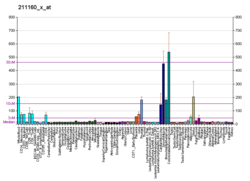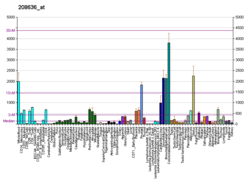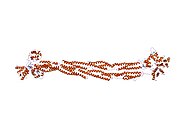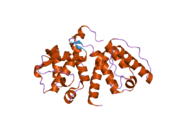Alpha-actinin-1
Alpha-actinin-1 is a protein that in humans is encoded by the ACTN1 gene.[5]
Function
Alpha actinins belong to the spectrin gene superfamily which represents a diverse group of cytoskeletal proteins, including the alpha and beta spectrins and dystrophins. Alpha actinin is an actin-binding protein with multiple roles in different cell types. In nonmuscle cells, the cytoskeletal isoform is found along microfilament bundles and adherens-type junctions, where it is involved in binding actin to the membrane. In contrast, skeletal, cardiac, and smooth muscle isoforms are localized to the Z-disc and analogous dense bodies, where they help anchor the myofibrillar actin filaments. This gene encodes a nonmuscle, cytoskeletal, alpha actinin isoform and maps to the same site as the structurally similar erythroid beta spectrin gene.[6]
Interactions
Actinin, alpha 1 has been shown to interact with:
- CDK5R1,[7]
- CDK5R2,[7]
- Collagen, type XVII, alpha 1,[8]
- GIPC1,[9]
- PDLIM1,[10][11]
- Protein kinase N1,[12]
- SSX2IP,[13] and
- Zyxin.[14][15]
- PTPRT (PTPrho)[16]
See also
References
- ^ a b c GRCh38: Ensembl release 89: ENSG00000072110 – Ensembl, May 2017
- ^ a b c GRCm38: Ensembl release 89: ENSMUSG00000015143 – Ensembl, May 2017
- ^ "Human PubMed Reference:". National Center for Biotechnology Information, U.S. National Library of Medicine.
- ^ "Mouse PubMed Reference:". National Center for Biotechnology Information, U.S. National Library of Medicine.
- ^ Youssoufian H, McAfee M, Kwiatkowski DJ (Jul 1990). "Cloning and chromosomal localization of the human cytoskeletal alpha-actinin gene reveals linkage to the beta-spectrin gene". Am J Hum Genet. 47 (1): 62–72. PMC 1683765. PMID 2349951.
- ^ "Entrez Gene: ACTN1 actinin, alpha 1".
- ^ a b Dhavan R, Greer PL, Morabito MA, Orlando LR, Tsai LH (September 2002). "The cyclin-dependent kinase 5 activators p35 and p39 interact with the alpha-subunit of Ca2+/calmodulin-dependent protein kinase II and alpha-actinin-1 in a calcium-dependent manner". J. Neurosci. 22 (18): 7879–91. doi:10.1523/JNEUROSCI.22-18-07879.2002. PMC 6758084. PMID 12223541.
- ^ Gonzalez AM, Otey C, Edlund M, Jones JC (December 2001). "Interactions of a hemidesmosome component and actinin family members". J. Cell Sci. 114 (Pt 23): 4197–206. PMID 11739652.
- ^ Bunn RC, Jensen MA, Reed BC (April 1999). "Protein interactions with the glucose transporter binding protein GLUT1CBP that provide a link between GLUT1 and the cytoskeleton". Mol. Biol. Cell. 10 (4): 819–32. doi:10.1091/mbc.10.4.819. PMC 25204. PMID 10198040.
- ^ Vallenius T, Luukko K, Mäkelä TP (April 2000). "CLP-36 PDZ-LIM protein associates with nonmuscle alpha-actinin-1 and alpha-actinin-4". J. Biol. Chem. 275 (15): 11100–5. doi:10.1074/jbc.275.15.11100. PMID 10753915.
- ^ Bauer K, Kratzer M, Otte M, de Quintana KL, Hagmann J, Arnold GJ, Eckerskorn C, Lottspeich F, Siess W (December 2000). "Human CLP36, a PDZ-domain and LIM-domain protein, binds to alpha-actinin-1 and associates with actin filaments and stress fibers in activated platelets and endothelial cells". Blood. 96 (13): 4236–45. PMID 11110697.
- ^ Feng S, Reséndiz JC, Christodoulides N, Lu X, Arboleda D, Berndt MC, Kroll MH (January 2002). "Pathological shear stress stimulates the tyrosine phosphorylation of alpha-actinin associated with the glycoprotein Ib-IX complex". Biochemistry. 41 (4): 1100–8. doi:10.1021/bi0156005. PMID 11802708.
- ^ Asada M, Irie K, Morimoto K, Yamada A, Ikeda W, Takeuchi M, Takai Y (February 2003). "ADIP, a novel Afadin- and alpha-actinin-binding protein localized at cell-cell adherens junctions". J. Biol. Chem. 278 (6): 4103–11. doi:10.1074/jbc.M209832200. PMID 12446711.
- ^ Reinhard M, Zumbrunn J, Jaquemar D, Kuhn M, Walter U, Trueb B (May 1999). "An alpha-actinin binding site of zyxin is essential for subcellular zyxin localization and alpha-actinin recruitment". J. Biol. Chem. 274 (19): 13410–8. doi:10.1074/jbc.274.19.13410. PMID 10224105.
- ^ Li B, Trueb B (September 2001). "Analysis of the alpha-actinin/zyxin interaction". J. Biol. Chem. 276 (36): 33328–35. doi:10.1074/jbc.M100789200. PMID 11423549.
- ^ Besco JA, Hooft van Huijsduijnen R, Frostholm A, Rotter A (2006). "Intracellular substrates of brain-enriched receptor protein tyrosine phosphatase rho (RPTPrho/PTPRT)". Brain Res. 1116 (1): 50–7. doi:10.1016/j.brainres.2006.07.122. PMID 16973135.
Further reading
- Snásel J, Pichová I (1997). "The cleavage of host cell proteins by HIV-1 protease". Folia Biol. (Praha). 42 (5): 227–30. doi:10.1007/BF02818986. PMID 8997639.
- Menko S, Philp N, Veneziale B, Walker J (1998). "Integrins and development: how might these receptors regulate differentiation of the lens". Ann. N. Y. Acad. Sci. 842: 36–41. doi:10.1111/j.1749-6632.1998.tb09629.x. PMID 9599291.
- Yürüker B, Niggli V (1992). "Alpha-actinin and vinculin in human neutrophils: reorganization during adhesion and relation to the actin network". J. Cell Sci. 101 (2): 403–14. PMID 1629252.
- Tokuue Y, Goto S, Imamura M, et al. (1992). "Transfection of chicken skeletal muscle alpha-actinin cDNA into nonmuscle and myogenic cells: dimerization is not essential for alpha-actinin to bind to microfilaments". Exp. Cell Res. 197 (2): 158–67. doi:10.1016/0014-4827(91)90418-T. PMID 1720388.
- Shoeman RL, Kesselmier C, Mothes E, et al. (1991). "Non-viral cellular substrates for human immunodeficiency virus type 1 protease". FEBS Lett. 278 (2): 199–203. doi:10.1016/0014-5793(91)80116-K. PMID 1991513.
- Nishiyama M, Ozturk M, Frohlich M, et al. (1990). "Expression of human alpha-actinin in human hepatocellular carcinoma". Cancer Res. 50 (19): 6291–4. PMID 2169343.
- Millake DB, Blanchard AD, Patel B, Critchley DR (1989). "The cDNA sequence of a human placental alpha-actinin". Nucleic Acids Res. 17 (16): 6725. doi:10.1093/nar/17.16.6725. PMC 318366. PMID 2780298.
- Dubernard V, Faucher D, Launay JM, Legrand C (1995). "Identification of the cytoskeletal protein alpha-actinin as a platelet thrombospondin-binding protein". FEBS Lett. 364 (2): 109–14. doi:10.1016/0014-5793(95)00362-D. PMID 7750553.
- Knudsen KA, Soler AP, Johnson KR, Wheelock MJ (1995). "Interaction of alpha-actinin with the cadherin/catenin cell-cell adhesion complex via alpha-catenin". J. Cell Biol. 130 (1): 67–77. doi:10.1083/jcb.130.1.67. PMC 2120515. PMID 7790378.
- Glück U, Ben-Ze'ev A (1995). "Modulation of alpha-actinin levels affects cell motility and confers tumorigenicity on 3T3 cells". J. Cell Sci. 107 (7): 1773–82. PMID 7983147.
- Maruyama K, Sugano S (1994). "Oligo-capping: a simple method to replace the cap structure of eukaryotic mRNAs with oligoribonucleotides". Gene. 138 (1–2): 171–4. doi:10.1016/0378-1119(94)90802-8. PMID 8125298.
- Egerton M, Moritz RL, Druker B, et al. (1996). "Identification of the 70kD heat shock cognate protein (Hsc70) and alpha-actinin-1 as novel phosphotyrosine-containing proteins in T lymphocytes". Biochem. Biophys. Res. Commun. 224 (3): 666–74. doi:10.1006/bbrc.1996.1082. PMID 8713105.
- Mukai H, Toshimori M, Shibata H, et al. (1997). "Interaction of PKN with alpha-actinin". J. Biol. Chem. 272 (8): 4740–6. doi:10.1074/jbc.272.8.4740. PMID 9030526.
- Suzuki Y, Yoshitomo-Nakagawa K, Maruyama K, et al. (1997). "Construction and characterization of a full length-enriched and a 5'-end-enriched cDNA library". Gene. 200 (1–2): 149–56. doi:10.1016/S0378-1119(97)00411-3. PMID 9373149.
- Hazan RB, Norton L (1998). "The epidermal growth factor receptor modulates the interaction of E-cadherin with the actin cytoskeleton". J. Biol. Chem. 273 (15): 9078–84. doi:10.1074/jbc.273.15.9078. PMID 9535896.
- Bunn RC, Jensen MA, Reed BC (1999). "Protein interactions with the glucose transporter binding protein GLUT1CBP that provide a link between GLUT1 and the cytoskeleton". Mol. Biol. Cell. 10 (4): 819–32. doi:10.1091/mbc.10.4.819. PMC 25204. PMID 10198040.
- Reinhard M, Zumbrunn J, Jaquemar D, et al. (1999). "An alpha-actinin binding site of zyxin is essential for subcellular zyxin localization and alpha-actinin recruitment". J. Biol. Chem. 274 (19): 13410–8. doi:10.1074/jbc.274.19.13410. PMID 10224105.
External links
- Actinin, alpha 1 Info with links in the Cell Migration Gateway
- Human ACTN1 genome location and ACTN1 gene details page in the UCSC Genome Browser.











